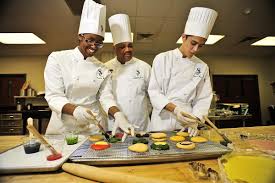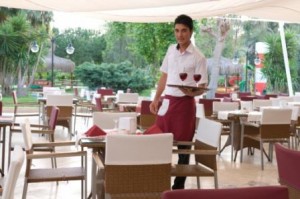
Hospitality jobs in the Middle East and in Western countries are worthwhile stepping stones to successful careers in the industry. Around the world, approximately 75 million more jobs are expected to be created in the travel industry over the next 10 years, says top audit firm Ernst & Young.
While each establishment has its own requirements, there are certain positions that are inevitable to fulfil world-class standards. Food production involves bakery, specialty kitchen and the cold section. The major positions are filled in the specialty kitchen and cold sections. At the entry level, you will be a junior assistant cook undertaking duties including preparation of basic food, organising the storeroom and keeping the work areas clean.
Assistant cooks generally prepare dishes as directed by seniors and ensure their quality. In some large kitchens, such as cruise lines, they are often assigned to a single station such as pasta, or salad, or bread. They also oversee use of supply, maintain sanitation standards and sometimes help test recipes.
A cook does much of the actual cooking that goes on in a restaurant with the aid of the assistant cook. They ensure that the customer is served a meal according to his/her request, taking into account any additions or subtractions desired from the meal such as spice level, allergies or dietary restrictions.
A chef de partie – station cook or line chef – heads a particular area of production with a demi chef de partie for assistance. Together, they prepare the food according to the standards and recipes of the restaurant they work in. Establishments often require you to work as a chef de partie trainee before being allowed to officially hold the title.
Together with the assistant butcher, the butcher prepares various meats from beef, pork, lamb, poultry and fish, to game birds, crustaceans, and other exotic cuts. They cut, trim, bone, tie, grind and slice, as well as prepare and place the cuts in an attractive display.
In the pastry department, there’s a pastry assistant, demi chef de partie and chef de partie who do exactly the same jobs as the counterparts in the kitchen, butinstead focus on desserts. Bakers and their assistants prepare a wide range of baked goods, particularly different types of bread. From the mixing of the ingredients to the product emerging warm out of the oven, they are involved at every step of the way.
The junior sous chef and sous chef are under the command of the executive chef. The sous chef is responsible for operations in the absence of the executive chef, and generally looks after scheduling of personnel, inventory, cleanliness, organisation and training. He/she also fills in for the chef de partie when needed. This hierarchy is replicated in the pastry department.
The entire staff is assisted by the utility rounds, assistant pantryman, utility cleaner, utility pantryman, and cook tournant.

Hospitality also involves the food & beverage(F&B) service department. Just like the food production division, the utility restaurant and utility snack personnel ensure impeccable cleanliness and hygiene in the areas under their responsibility.
Among the cruise ship jobs often overlooked is that of the mess steward. He/she ensures that the crew have enough to eat by replenishing the buffet service counters in the mess, cleaning the area and making sure soiled dishes and cutlery are taken back to the galley and replaced with clean ones. His/her counterpart in the hospitality division is the room service steward.
Junior assistant waiters, assistant waiters, waiters, assistant buffet waiters and buffet waiters engage in similar jobs, differing only in a hierarchy that comes with experience. They take reservations, set the tables, welcome guests and recommend dishes, convey the orders to the kitchen along with special requests, serve food, make and present bills, handle payments and also clear the tables.
In the beverage, or bar, section, these jobs are handled by the deck steward and deck supervisor who manage the pool area, and the bar waiter and assistant bartender who work in restaurants. Bartenders may also be hired for their flair skills, and all must have good knowledge of spirits and cocktails. Sommeliers have the specialised job of providing wine service and recommendations along with pairing wine with food.

Under housekeeping for hotels and cruise lines, utility hotel staff are engaged in janitorial work and ensure all areas are kept clean and sanitised. Cabin stewards are specific to cruise ship jobs, and are generally assigned a number of cabins to keep clean and tidy. The assistant cabin stewards help out before they learn the job well enough to be promoted.
With cleanliness a major feature in the hospitality industry, the linen keeper’s job is also quite important. They ensure that all linen is laundered, stored, and either replaced or repaired. Anything with stains or tears cannot go back into the rooms. He/she also ensures that the linen and soft furnishings in the restaurants, as well as aprons and staff uniforms are clean.
Many hotels also require a tailor whose job involves darning uniforms, linen and upholstery; stitching and altering uniforms according to specifications; any altering required by guests; and other duties required by the hotel.
Jobs are clearly aplenty in the hospitality industry around the world. It’s simply a matter of choosing which sector gives you the most satisfaction.













